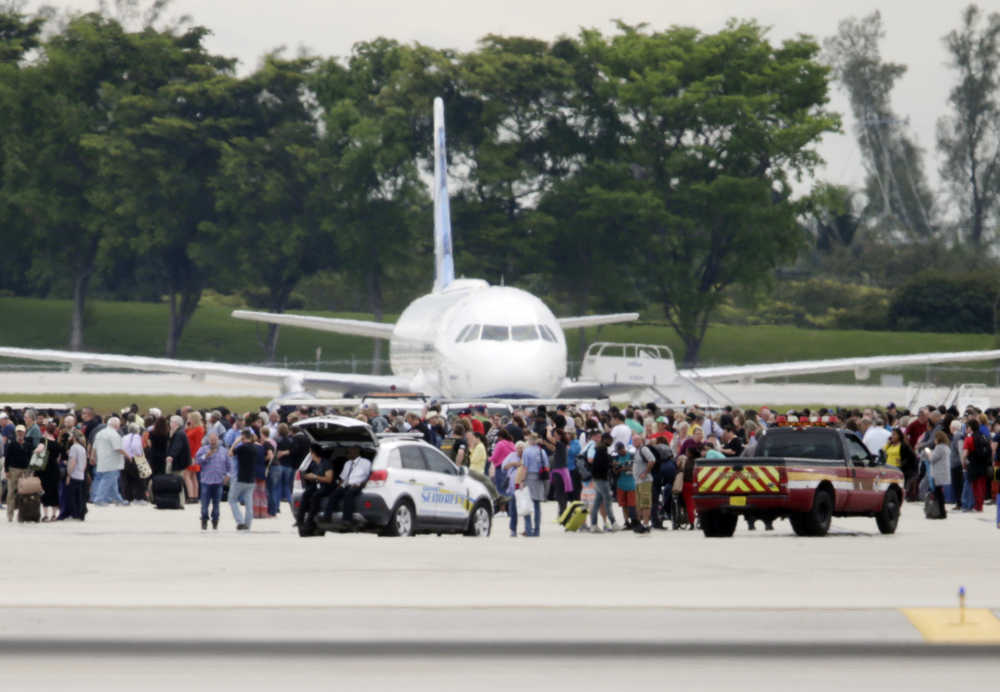FORT LAUDERDALE, Fla. — An Army veteran who landed at the Fort Lauderdale airport with a gun in his checked luggage opened fire in the baggage claim area Friday, killing five people and wounding eight before throwing his weapon down and lying spread-eagle on the ground, authorities and witnesses said.
The gunman — identified by authorities as 26-year-old Esteban Santiago, who served in Iraq with the National Guard but was demoted and discharged last year for unsatisfactory performance — was immediately taken into custody. His brother said he had been receiving psychological treatment recently.
“We don’t know a motive at this point,” said Sen. Bill Nelson of Florida. “This could well be someone who is mentally deranged, or in fact it could be someone who had a much more sinister motive that we have to worry about every day, and that is terrorism.”
One witness said the attacker gunned down his victims without a word and kept shooting until he ran out of ammunition for his handgun, sending panicked travelers running out of the terminal and spilling onto the tarmac, baggage in hand.
Others crouched behind cars or anything else they could find to shield themselves as police and paramedics rushed in to help the wounded and establish whether there were any other gunmen. The airport was shut down.
“People started kind of screaming and trying to get out of any door they could or hide under the chairs,” a witness, Mark Lea, told MSNBC. “He just kind of continued coming in, just randomly shooting at people, no rhyme or reason to it.”
It is legal for airline passengers to travel with guns and ammunition as long as the firearms are put in a checked bag — not a carry-on — and are unloaded and locked in a hard-sided container. Guns must be declared to the airline at check-in.
Santiago arrived in Fort Lauderdale after taking off from his hometown of Anchorage aboard a Delta flight Thursday night, checking only one piece of luggage — his gun, said Jesse Davis, police chief at the Anchorage airport.
At Fort Lauderdale, “after he claimed his bag, he went into the bathroom and loaded the gun and started shooting. We don’t know why,” said Chip LaMarca, a Broward County commissioner who was briefed by investigators.
The bloodshed is likely to raise questions of whether aviation safety officials need to change the rules.
The attack also exposed another weak point in airport security: While travelers have to take off their shoes, put their carry-on luggage through X-ray machines and pass through metal detectors to reach the gates, many other sections of airports, such as ticket counters and baggage claim areas, are more lightly secured and more vulnerable to attack.
In the Fort Lauderdale attack, Lea said the gunman said nothing as he “went up and down the carousels of the baggage claim, shooting through luggage to get at people that were hiding.” The killer went through about three magazines before running out of ammunition, Lea said.
“He threw the gun down and laid spread-eagle on the ground until the officer came up to him,” Lea said.
Sheriff Scott Israel said five people were killed and eight were wounded. The condition of the wounded was not disclosed. The gunman was arrested unharmed, with no shots fired by law enforcement officers, and was being questioned by the FBI, the sheriff said.
Santiago’s brother, Bryan, told The Associated Press that his brother had been receiving psychological treatment in Alaska. He said Santiago’s girlfriend alerted the family to the situation in recent months.
Bryan Santiago said that he didn’t know what his brother was being treated for and that they never talked about it over the telephone.
“We have not talked for the past three weeks,” Bryan Santiago said. “That’s a bit unusual … I’m in shock. He was a serious person … He was a normal person.”
He said Esteban Santiago was born in New Jersey and moved to Puerto Rico when he was 2. He was deployed to Iraq in 2010 and spent a year there with the 130th Engineer Battalion, according to Puerto Rico National Guard spokesman Maj. Paul Dahlen. He later joined the Alaska National Guard.
The Pentagon said Santiago had gone AWOL several times during his stint with the Alaska National Guard and was demoted — from specialist to private first class — and given a general discharge, which is lower than an honorable discharge.
Still, he’d had some successes during his military career, being awarded a number of medals and commendations including the Iraq Campaign Medal and the Global War on Terrorism Service Medal.
His uncle and aunt in New Jersey were trying to make sense of what they were hearing about Santiago after his arrest at the Fort Lauderdale airport. FBI agents arrived at their house to question them, and reporters swarmed the house.
“Only thing I could tell you was when he came out of Iraq, he wasn’t feeling too good,” his uncle, Hernan Rivera, told the Bergen Record newspaper
Maria Ruiz told the Record that her nephew had recently become a father and was struggling with the role.
“It was like he lost his mind,” she said of his return from Iraq. “He said he saw things.”
He was involved in a number of minor court cases in Alaska, including fines for not having proof of insurance and a criminal mischief case that led to a deferred sentence. His attorney, Max Holmquist, declined to discuss his client with an AP reporter.
• Associated Press writers Freida Frisaro and Adriana Gomez-Licon in Miami; Lolita C. Baldor and Eric Tucker in Washington; David Koenig in Dallas; Becky Bohrer in Anchorage and Danica Coto in San Juan, Puerto Rico, contributed to this report.

